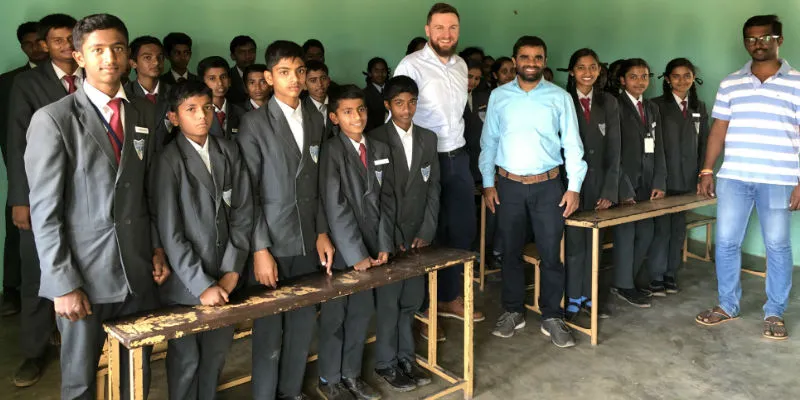How these 5 edtech startups are making learning easy and engaging for children
Technology is the future and it's imperative that we use it to help Gen Next learn. These 5 edtech startups are doing just that by boosting a child's inquisitiveness, sharing ideas, and deepening knowledge.
The potential of technology also brings many possible use-cases that can span categories and purposes. Technology is a part of life today, and otfen has parents rueing their children's screen time. Many kids now choose to spend most of their time in front of a computer or mobile screen, which can be addictive and can act as a hindrance to basic social skills, like communication and team spirit.
But technology isn't all bad. There's plenty of good that it can do, if harnessed in the right way. And many startups across India are trying to do just that.
1565685587653.png?fm=png&auto=format)
A glimpse of Byju Raveendran's tutorial videos
This Children's Day, we bring a list of edtech startups that are leveraging screen time and turning it into a productive and fun-based learning experience for children.
Brainly
Poland-based Brainly is designed to help students boost their inquisitiveness with a continuous flow of questions and radical solutions. The startup not just focuses on cracking puzzling questions but also on sharing ideas, deepening insights, and exploring knowledge.

Brainly CEO and Co-Founder Michał Borkowski with students.
The platform helps students with curriculum-related specific questions, unlike most edtech startups in India that only focus on test preparation and personalised learning programmes. Students connect with their peers to strengthen their skills in mathematics, science, history, among others. A question from a Class 10 student can be answered by another 10th grader or 12th grader.
Brainly is now present in more than 35 countries, clocking over 150 million active users globally. Claiming to be the world’s largest social learning community for students, it reports more than 15 million active users in India, as same as India’s first edtech unicorn BYJU’s.
The Polish startup says it has witnessed 200 percent annual growth since it entered India in 2016 and claims to be the number one education website in India, in terms of the number of visits it gets. Indian students who use the platform comprise 42 percent secondary and 39 percent higher secondary grade students.
BYJU's
A list like this is incomplete without mentioning the world's highest valued edtech startup, which now stands at $5.7 billion.
Launched in 2015, Byju's - The Learning App, is a learning app for students across age groups with programmes in English and Hindi that make learning and understanding concepts easier for school kids.

Byju Raveendran's app has gone places as it helps children across India learn.
The subject focus of the platform is math and science, and the concepts are explained using 12-20 minute digital animated videos.
With 35 million registered students and 2.4 million annual paid subscriptions, Byju’s app is available on Google Play Store and Apple App Store. It is used by students every day from more than 1,700 cities.
The average time a student spends on the app has increased from 64 minutes to 71 minutes over the last 12 months. At present, the startup is one of the few Indian companies that has witnessed 100 percent growth in three consecutive years. In FY19, it recorded a massive 200 percent growth.
Toppr
Mumbai-based Toppr offers its personalised learning app for students studying for boards, Olympiads, various engineering, commerce, and medical competitive exams. It provides students access to 24x7 e-learning, quick doubt-solving, and personalised coaching from quality educators across the country.

Zishaan Hayath, CEO and founder, Toppr.
After having made a dent in the online test preparation space, Toppr turned its attention towards junior and senior grades (Classes 5 to 12), which form the largest chunk of India’s student population. This year, six years since inception, the edtech startup also offers courses catering to 25 schools, from ICSE and CBSE to several state boards.
Its registered user base has expanded to seven million across mobile and desktop, with 6.6 million monthly sessions being clocked.
From just 40,000 pieces of content in 2013, Toppr now houses two million pieces of learning material and aims to reach three million by 2020. It has solved more than four million doubts, and more than three million tests have been taken on its platform.
Having started as a five-member team, Toppr is now 350-people strong with offices in Mumbai and Hyderabad.
Myedubag
With online education slowly became the most sought after alternative after higher education, K-12 classrooms are not far behind. To help children make the most out of it, mother-son duo Anuradha Pradhan and Abhinav Pradhan started Myedubag in 2015. The edtech platform focusses on providing an integrated one-stop solution for students in the K-12 segment (kindergarten to Class 12).

Abhinav Pradhan, Founder of Myedubag
The Delhi-based startup provides academic and non-academic study material in the form of audio-visual and text content. It also sells textbooks and provides complimentary counselling to students, parents, and teachers. Currently, it has up to 400 students on its platform.
Myedubag also helps parents pay school fees online. While books are sold at discounted prices, e-learning is provided on a subscription basis at prices ranging between Rs 500 and Rs 5,000 per year. The startup also provides academic and non-academic modules for self-learning. Academic modules are usually in the form of audio-visuals, PDF learning materials, and live video classes. Myedubag also provides language learning content for non-academic users.
All the content is conceptualised by academicians and professionals from IITs, IIMs, and teachers from other schools. The platform also offers a foundation course for IIT-JEE aspirants.
Emotix
With a team of engineers, mathematicians, artists, and neuro-psychologists, Emotix created Miko, an artificial intelligence (AI)-based companion robot.

Emotix founding team
Founded in 2014 in Mumbai, Emotix's emotionally intelligent companion robot, Miko, has the capabilities of engaging, educating, and entertaining a child. Having spent two years in perfecting the product, the team has programmed social interactions and an adaptive personality to Miko. This allows the companion bot to leverage its knowledge base (powered by the internet) to talk, respond, and learn information about a child to guide interactions. Over time, Miko will be able to adapt and cater to specific needs.
The robot is capable of engaging, educating, and entertaining children above five years of age, helping them in early education and playful learning. It can initiate and hold conversations, impart knowledge based on academic curriculum, and talk about general facts.
Recently, Miko had an upgrade to Miko 2.0. The versions Miko 1.0 and Miko 2.0 are priced at Rs 19,000 and Rs 25,000, respectively.
(Edited by Suman Singh)


1565685587653.png?mode=crop&crop=faces&ar=2%3A1&format=auto&w=1920&q=75)










